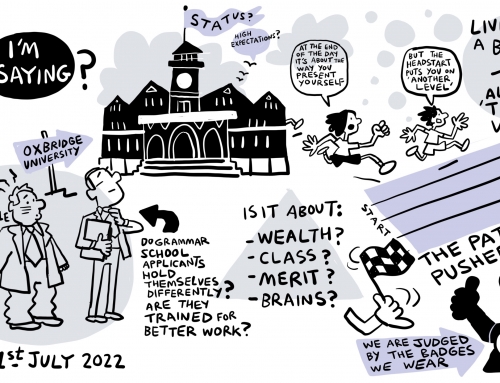By Jo Bartley
Our Future Thoughts series of articles are opinion pieces designed to provoke debate, they represent the views of the author and not Comprehensive Future policy.
 A Kent head teacher explained to me a common problem his school faced each September. Pupils would start leaving after just a few days in the school. It was nothing his school was doing wrong. But when the nearby grammar school has empty desks to fill they put the word out. Parents move their children to the more prestigious school. There’s nothing the head can do to stop this.
A Kent head teacher explained to me a common problem his school faced each September. Pupils would start leaving after just a few days in the school. It was nothing his school was doing wrong. But when the nearby grammar school has empty desks to fill they put the word out. Parents move their children to the more prestigious school. There’s nothing the head can do to stop this.
Grammar schools stop being selective whenever it suits them. Some selective schools admit more than 30 pupils without 11-plus passes through appeals each year. Education is a business, and empty desks don’t pay. Only grammar schools can be confident their schools will fill. Non-selective schools just have to accept that selective schools wreck their business.
Last week Damian Hinds created a £50 million expansion fund for grammar schools. In doing so he ignored the views of both the teaching profession and of countless research papers proving selection doesn’t work. Responses to the Schools that Work for Everyone consultation stated: “a significant number of respondents used the forum of the consultation to raise concerns about selection.” Evidently these responses were filed under “we don’t care.”
Regardless of how bad the policy is, it’s hard to see how it fits with the Conservative’s ‘schools market’ idea. Hinds’ plan to incentivise grammar school expansion unfairly manipulates the market, supporting one type of school at the expense of another. The system is rigged in favour of grammar schools. Secondary moderns are in a competition where they’re bound to lose. It’s not hard to see why.
The very presence of a grammar school turns nearby non-selective schools into a school for the “less academically inclined.” No parent wants their child labelled ‘less academic,’ so these schools never have parity of esteem.
Another issue is that these schools have no control over grammar schools taking high attaining pupils from their classrooms. And this “creaming” of pupils creates only problems. It means dropping top sets, narrowing the curriculum, losing league table status, and becoming less aspirational places.
What’s more these schools lose per-pupil funding, an issue that will become more significant now grammar schools have finance to expand. Less cash means difficult financial decisions and even the loss of teaching staff.
No one can blame parents for wanting a grammar school place for their child. These schools offer a vision of Oxbridge, top exam grades, and the very best teachers (even when their academic results fail to live up to the billing). “Grammar schools are popular” is a bad reason to want more, we shouldn’t build our school system around aspirational parents following a marketing dream. The Education Secretary needs to see beyond this, he should understand the harmful effect on the school system as a whole.
Had Theresa May won a majority in last year’s election we would now be seeing plans for a new wave of grammar schools. Instead the grammar school lobby got the next best option, some £50 million for their cause.
Meanwhile secondary modern head teachers rarely talk about the problems their schools face. To do so would be to admit the “secondary modern effect” was real, which would dent their already troubled image. The school market forces them to stay silent. So they suffer, and the children divided with a discredited 11-plus test suffer too.
Joanne Bartley is the joint co-ordinator of the Kent Education Network and Campaign Support Officer for Comprehensive Future. She is writing this in her personal capacity. This article first appeared in Education Journal.




